The Trump administration's Russia-Ukraine policy has turned sharply, bypassing Europe and directly engaging in “cross-border diplomacy” with Russia. Vice President Vance even dropped a “bombshell” at the Munich Security Conference... Shock, anger, disappointment, protest, the complex emotions of European political elites are no longer enough to be summarized in a few adjectives.
How will Trump's policy shift impact Europe's position on aid to Ukraine? Vance's speech made the contradictions in transatlantic relations public. What will it mean for EU-US relations in the next four years? At a time when the world situation is becoming increasingly uncertain, how can China's voice show greater influence on a platform dominated by Western establishment elites?
Guancha Syndicate: At this Munich Security Conference, the Russia-Ukraine conflict was an inseparable topic. Could you please share the atmosphere of discussion on this topic on site and how it is different from previous meetings?
Jiang Feng: The Russia-Ukraine conflict has entered a very critical period in 2025. Due to the change of government, the United States 'Ukraine policy has entered a new stage and ushered in very big changes. From fully supporting Ukraine to fully promoting a ceasefire as soon as possible, this has brought a completely different atmosphere from the past. In addition, the United States and Europe originally stood together to support Ukraine. Today, the United States has had direct contacts with Russia to discuss ending the war. Europeans and Ukraine have deeply felt the feeling of being “overthrown diplomacy.” In particular, US Vice President Vance's speech at the was a huge impact on Europeans. One of my direct feelings at the scene was that Europeans were very worried, anxious and disappointed that the United States had shown ideas or attempts to solve the Ukraine problem. Whether it is a big country or a small country, politicians, soldiers or scholars, they are all dissatisfied with the United States 'practice of negotiating across Europe, Ukraine and Russia. In addition to dissatisfaction, the general position of European representatives at the Munich Security Conference was that Europeans would not accept any decision between the United States and Russia on a ceasefire in Ukraine as long as Europe and Ukraine did not participate in the negotiation process. In addition, Europe and Ukraine require participation in all negotiation processes surrounding the armistice. In terms of specific conditions, leaders of some European countries insisted that Ukraine's accession to the EU and NATO were “non-negotiable” and believed that Russia had no right to make demands. U.S. Defense Secretary Hegseth has said that it is “unimaginable” for Ukraine to join NATO and it is unrealistic to return to the territorial status before 2014. Therefore, there are huge differences between Europe and the United States in handling the Russia-Ukraine conflict, from starting point to principle.
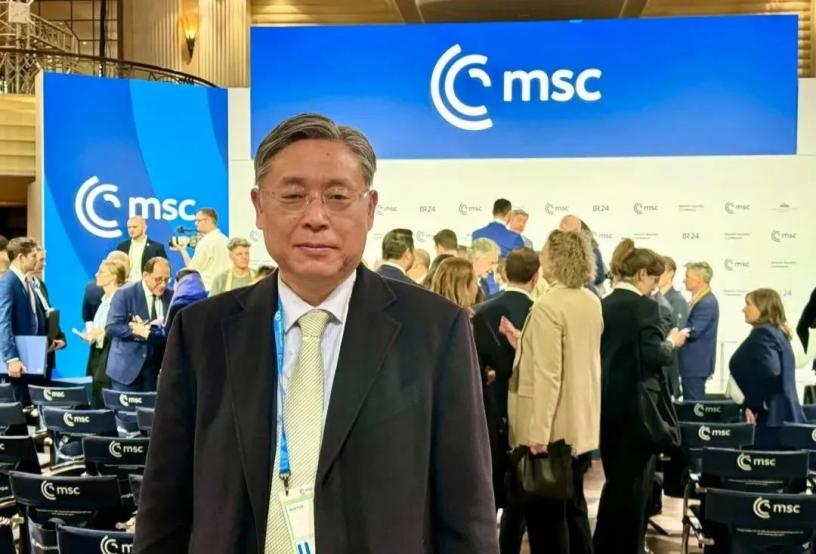
Photo provided by Professor Jiang Feng by interviewees at the Munich Security Conference
I also noticed that the European representative suggested that Europe itself needs to reflect on what it is not doing well or fast enough. It should “do more and talk less”. It should proactively propose solutions and promote solutions to problems, rather than waiting for solutions to be delivered to its door.
Guancha Syndicate: At this meeting, what specific proposals did European countries put forward on dealing with the Russia-Ukraine conflict? What are the differences?
Jiang Feng: First of all, there are many voices of anger, disappointment and protest in Europe regarding the current situation of the Russia-Ukraine conflict, but there is no unified voice on the whole. The first voice, represented by the leaders of some small countries, believes that we should no longer hesitate or argue, but should give people, money, and weapons, increase aid to Ukraine, and pursue rapid victory in this war. Only in this way can Russia be willing to negotiate and a fair resolution of the Russia-Ukraine conflict is possible. Leaders of some countries, mainly small countries, even proposed that Europe should enter a “state of war” and “state of emergency.” Another voice calls for Europe to quickly form an army and send it to Ukraine. But there is another contradiction here. The French Defense Minister said that troops can be sent, but someone needs to provide air cover and other supporting support. The impression is that only when all issues are arranged can they send troops to Ukraine. It's not like going to war, it's like going on vacation. There were also voices on the scene who disagreed with the establishment of a European army, believing that Europe could not do it.
Representatives of the third voice, including German CDU Chairman and Prime Minister Candidate Merz, said that Germany can provide Taurus Cruise Missiles to Ukraine, provided that all countries move in unison and coordinate well on aid issues. Merz also pointed out that in strengthening Europe's own security and defense capabilities, it is not enough to invest money alone, because the systems of various countries are different and a unified security system needs to be fundamentally formed. It gives people the feeling that all kinds of words have been made clear and feasible, but in the end nothing can be done. The discussion at this UPS meeting once again highlighted the urgency of forming a European army. Ukraine President Zelensky was also very dissatisfied when he spoke. He said that without a European army, Europe's security problems could not be truly solved. Nowadays, the only one in Europe with practical experience is the Ukraine army, and the Ukrainian army is “the best army in the world in the field of drone warfare.” Zelensky believes that the Ukrainian army should become the core part of forming a European army.
Video screenshot of Ukraine President Zelensky's speech at the Munich Security Conference
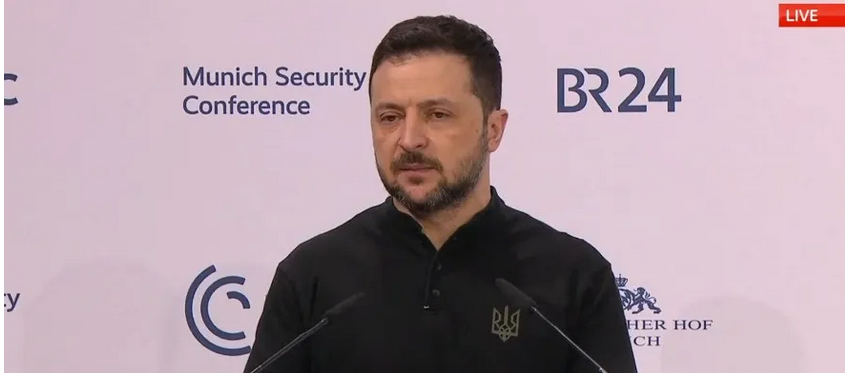
Some national leaders have put forward relatively different views. Finnish President Stubb believes that in addition to being independent and controlling its own destiny, Europe also needs to have a concept of time. He does not believe that Russia can cooperate as the new U.S. administration expects to resolve the Russia-Ukraine conflict quickly, and believes that Russia's attitude will be so repetitive that it will anger the Trump administration. Therefore, Stubb suggested that Europe should “maintain its determination” and strive to make the United States feel that Russia is not trustworthy and that pursuing a truce regardless of the interests of Europeans and Ukraine cannot succeed. If this situation ultimately emerges, at least some European leaders believe that Trump will still return to the path of cooperating with Europe to resolve conflicts.
Guancha Syndicate: US Vice President Vance's speech at the Munich Security Conference caused huge controversy and put the contradiction between the United States and Europe on the table. According to your on-site observation, how much impact has this had on European representatives?
Jiang Feng: It was indeed a very big impact. European representatives generally used the word shock. They knew that the U.S. policy towards Europe would change, but they did not expect it to become so profound and intense. The speech shook one of the foundations of transatlantic relations, namely shared values. Vance believes that Europe's democratic principles are wrong and there is something wrong with its systems, saying that the main threat facing Europe comes not from the outside, but from within, and from the establishment's fear of the freely expressed will of the people. These words completely negated the current system and quality of democracy in Europe and made it difficult for Europeans to accept. Including The Federal Ministry of Defence(Germany)and The Chancellor of Germany, they all refuted in their subsequent speeches.
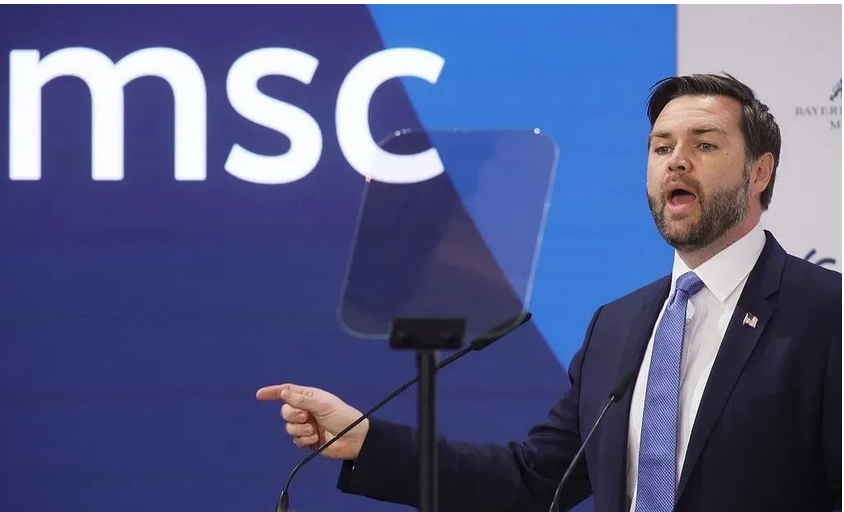
On February 14, local time, US Vice President Vance delivered a speech at the 61st Munich Security Conference Visual China
Guancha Syndicate: On the 14th, Vance also met with German AFD leader Weidel in Munich. Combined with Musk's previous series of practices in supporting European “right-wing” parties, can Vance's speech represent a “starting gun” for the United States to promote a “right turn” in European politics? How to assess its significance?
Jiang Feng: It should be said that Vance's speech had a very big impact on the current political system and political culture in Europe, and has formed a great impetus for the extreme trend of European politics. As social divisions lead to political divisions and the overall turn to the right, the populist trend of thought in Europe has gained momentum in recent years, which is very obvious. Secondly, this marks that European and American relations will fall into friction for a long period of time, because it exposes the differences in basic values between the two sides, that is, the starting points for handling each other's relations are different. In the future, the Trump administration will be more concerned about how to reduce investment in Europe while obtaining greater benefits. Among them, for example, on the issue of bilateral trade deficits and the issue of defense budgets, the United States requires Europe to increase investment, while it itself wants to obtain greater returns. The third issue is the key high-tech fields related to future scientific and technological, political and economic development, especially artificial intelligence. The United States regards it as a core interest to maintain global hegemony and supports the global expansion of its high-tech enterprises. The EU has set many regulations and restrictions in areas such as data protection and artificial intelligence development. This certainly makes sense, but in the eyes of the United States, it restricts the expansion of U.S. technological power and harms U.S. interests. Therefore, in the above three aspects, the friction between Europe and the United States will become more intense in the next four years. Coupled with the differences in values now exposed, the relevant contradictions may be further amplified.
Guancha Syndicate: In the past few years, due to the impact of the Russia-Ukraine War and the impact of inflation, the economies of European countries have generally weakened, leading to social division and the rise of Far-Right Parties. Against this background, how high do you think public opinion support is for European countries to continue to aid Ukraine despite financial difficulties?
Jiang Feng: On the one hand, Europe believes that it has no choice, because giving up aid to Ukraine means surrendering across the board, and there is no need to talk about strategic autonomy anymore. Therefore, Europe views the Russia-Ukraine conflict from a strategic and life-and-death perspective. Leaders of many European countries strongly stated at the Munich Security Conference that Europe needs to maintain strategic determination and strength. A senior official from The General Staff of the Ukrainian Armed Forces also warned that if Ukraine is finished, it means that Europe is also finished. So far, Europe has tied its destiny too closely to the destiny of Ukraine, making it difficult to take a step back, and military assistance to Ukraine has become an unavoidable option. But the key problem is that Europe does not have its own military power. Currently, it mainly relies on NATO's security cooperation framework and the leadership of the United States. So today, Europe shouts slogans very loudly, but the ability to actually do things is very weak. I think in the short term, it will be difficult for Europe itself to make a relatively big difference on the issue of military assistance. If it does, it will still be carried out under the framework of the leadership of the United States. As the war situation becomes increasingly unfavorable to Ukraine, once the United States and Russia start the negotiation process, and as Europeans are worried, there is no substantial participation from Europe and Ukraine-at least at the beginning, Europe can only accept it with courage. At that point, EU-US relations will face a very severe test.
However, whether the situation will reach that point will still depend on the Trump administration's balance, that is, whether they want to push US-EU relations to such a point where conflicts intensify. Alternatively, the United States may also use US-EU relations as a threat to demand European cooperation and in turn force Ukraine to accept ceasefire conditions, including territorial concessions, not joining NATO, and providing Ukraine with some substantive security guarantees. In the end, this depends on the judgment of the United States. After all, the United States is a key force in resolving the conflict between Russia and Ukraine.
Guancha Syndicate: Chinese Foreign Minister Wang Yi delivered a keynote speech at the Munich Security Conference and met with political leaders from many countries, with frequent golden sentences. What kind of response did the voice of China arouse at the Munich Security Conference?
Jiang Feng: China's voice attracted great attention at this meeting. Many Europeans present believed that Foreign Minister Wang Yi's speech was in sharp contrast to Vice President Vance's speech. First, it was the goodwill expressed by China. Second, China emphasized safeguarding the international system with the United Nations at its core and abiding by the basic norms of international relations based on the purposes and principles of the UN Charter. This has completely different significance from Vance's isolationist purpose.
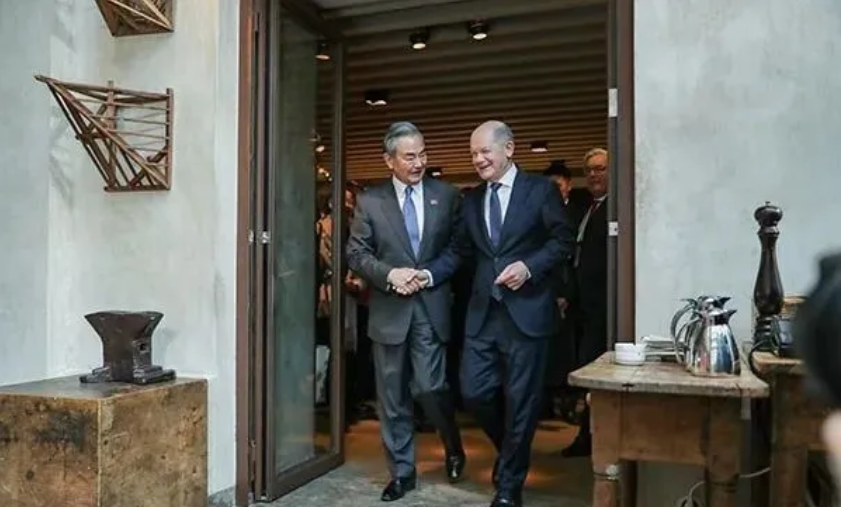
On February 15, local time, German Chancellor Scholz met with Wang Yi, member of the Political Bureau of the CPC Central Committee and Foreign Minister, in Munich. website of the Ministry of Foreign Affairs
We can feel that at a time when the international situation is relatively turbulent, the US Vice President strongly “taught” Europe at the Munich Security Conference and clearly expressed views that are different from European values. US-EU relations will face very severe challenges. In this context, Europeans are paying more and more attention to China's policies, concepts and actions, which may mean that China-EU relations have gained a new development opportunity. We look forward to seizing this opportunity to further deepen and expand the development of China-EU relations. In addition to bilateral relations themselves, we must also expand their significance to play a greater role in global order and global governance. That is, to view, define and develop China-EU relations from the perspective of true multilateralism, I think there is now a window of time.
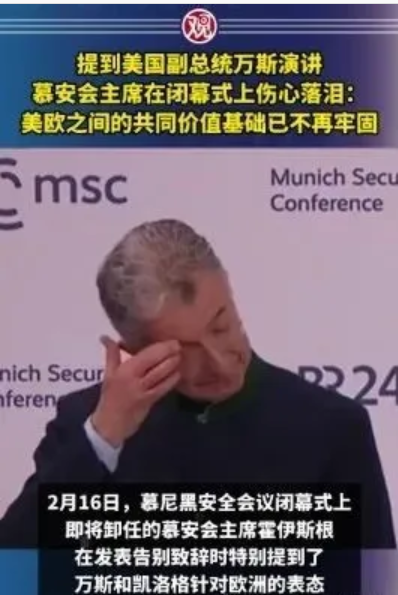
Of course, we must also realize that the contradiction between Europe and the United States, whether from an international, cultural or institutional perspective, belongs to a certain extent to an internal contradiction in the West. I noticed that during the discussions at the Munich Security Conference, almost all European leaders present at the meeting gave negative answers to the question of whether the United States could ask China to fill the space after reducing its investment in Europe. Therefore, from China's perspective, we should objectively and calmly judge Europe's development trend, and try to push China-EU relations from a practical perspective in a direction that is conducive to both sides 'understanding and realization of their respective vital interests. It is very important that China-EU relations should not be defined from the perspective of Sino-US relations or EU-US relations.
Author: Jiang Feng: Research Professsor at Shanghai International Studies University, Chairman of the Shanghai Academy of Global Governance and Area Studies.
Source: “Bottom Line Thinking” Weixin Official Accounts, February 18, 2025.
Translated and reviewed by Chen Xinran with AI translator




